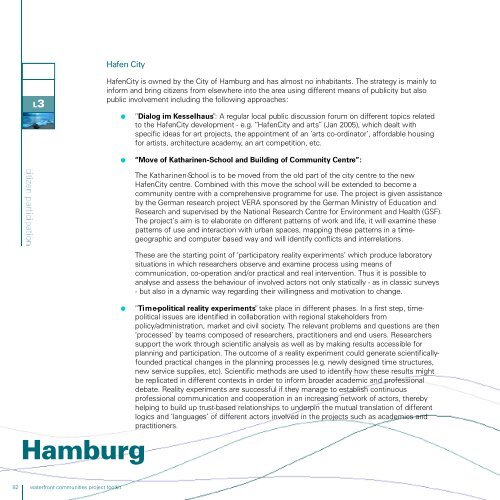citizen participation - waterfront communities project
citizen participation - waterfront communities project
citizen participation - waterfront communities project
You also want an ePaper? Increase the reach of your titles
YUMPU automatically turns print PDFs into web optimized ePapers that Google loves.
8 2<br />
L3<br />
<strong>waterfront</strong> <strong>communities</strong> <strong>project</strong> toolkit<br />
Hafen City<br />
H a m b u r g<br />
HafenCity is owned by the City of Hamburg and has almost no inhabitants. The strategy is mainly to<br />
inform and bring <strong>citizen</strong>s from elsewhere into the area using different means of publicity but also<br />
public involvement including the following approaches:<br />
� “Dialog im Ke s s e l h a u s”: A regular local public discussion forum on different topics related<br />
to the HafenCity development - e.g. “HafenCity and arts” (Jan 2005), which dealt with<br />
specific ideas for art <strong>project</strong>s, the appointment of an ‘arts co-o r d i n a t o r’, affordable housing<br />
for artists, architecture academy, an art competition, etc.<br />
� “Move of Katharinen-School and Building of Community Centre”:<br />
The Ka t h a r i n e n -School is to be moved from the old part of the city centre to the new<br />
HafenCity centre. Combined with this move the school will be extended to become a<br />
community centre with a comprehensive programme for use. The <strong>project</strong> is given assistance<br />
by the German research <strong>project</strong> VERA sponsored by the German Ministry of Education and<br />
Research and supervised by the National Research Centre for Environment and Health (GSF).<br />
The <strong>project</strong>’s aim is to elaborate on different patterns of work and life, it will examine these<br />
patterns of use and interaction with urban spaces, mapping these patterns in a timegeographic<br />
and computer based way and will identify conflicts and interrelations.<br />
These are the starting point of ‘participatory reality experiments’ which produce laboratory<br />
situations in which researchers observe and examine process using means of<br />
communication, co-operation and/or practical and real intervention. Thus it is possible to<br />
analyse and assess the behaviour of involved actors not only statically - as in classic surveys<br />
- but also in a dynamic way regarding their willingness and motivation to change.<br />
� “Ti m e-political reality ex p e r i m e n t s” take place in different phases. In a first step, timepolitical<br />
issues are identified in collaboration with regional stakeholders from<br />
policy/administration, market and civil society. The relevant problems and questions are then<br />
‘processed’ by teams composed of researchers, practitioners and end users. Re s e a r c h e r s<br />
support the work through scientific analysis as well as by making results accessible for<br />
planning and <strong>participation</strong>. The outcome of a reality experiment could generate scientificallyfounded<br />
practical changes in the planning processes (e.g. newly designed time structures,<br />
new service supplies, etc). Scientific methods are used to identify how these results might<br />
be replicated in different contexts in order to inform broader academic and professional<br />
debate. Reality experiments are successful if they manage to establish continuous<br />
professional communication and cooperation in an increasing network of actors, thereby<br />
helping to build up trust-based relationships to underpin the mutual translation of different<br />
logics and ‘languages’ of different actors involved in the <strong>project</strong>s such as academics and<br />
p r a c t i t i o n e r s .


